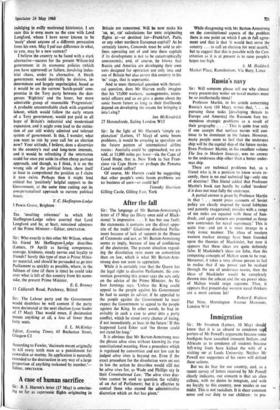After the fall
Sir: The language of Mr Barton-Armstrong's letter of 17 May (as Dicey once said of Black- stone) 'is impressive. . . . It has but one fault; the statements it contains are the direct oppo- site of the truth!' Gladstone dissolved Parlia- ment because of lack of support in the House of Commons and not, as Mr Barton-Armstrong seems to imply, because of loss of confidence of the electorate. The present situation regard- ing the dissolution rests more on convention than on law, which is what Mr Barton-Arm- strong does not seem to appreciate.
While it is certainly true that the Queen has the legal right to dissolve Parliament, the con- vention governing this power says she acts only on the advice of the Prime Minister. As Sir Ivor Jennings says. 'Unless the King could appeal to the people against his Government he had to accept its advice; if he appealed to the people against the Government he must expect the Government to appeal to the people against the King. In other words, he had in- evitably in such a case to enter into a party conflict, which he stood every chance of losing, if not immediately, at least in the future.' If this happened Lord Esher said 'the throne could not stand for long.'
It is obvious that Mr Barton-Armstrong uses the phrase ultra vires without knowing its true constitutional meaning. How a procedure which is regulated by convention and not law can be judged ultra vires is beyond me. Even if the exact procedure for the dissolution were set out in law the action he describes would still not be ultra vires for, as Wade and Phillips say in their Constitutional Law. 'The ultra vires doc- trine cannot be used to question the validity of an Act of Parliament; but it is effective to control those who exceed the administrative discretion which an Act has given.' While disagreeing with Mr Barton-Armstrong on the constitutional aspects of the problem there is one point on which I am in full agree- ment and that is that 'it would best serve the country . .. to call an election for next month,' but to suggest that this is possible with the Con- stitution as it is at present is to raise people's hopes too high.
S. M. Haddock Market Place, Ramsbottom, Via Bury, Lancs






































 Previous page
Previous page